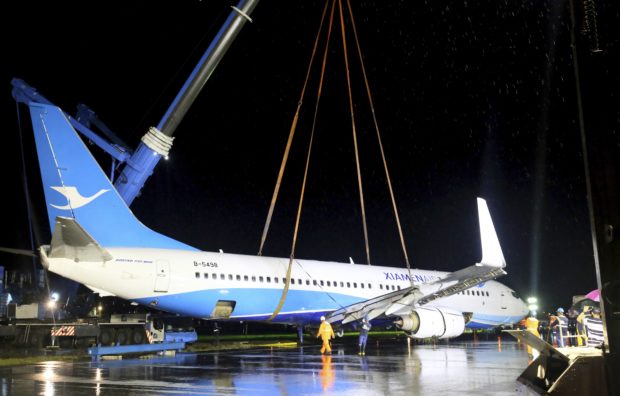
In this photo provided by the Manila International Airport Authority (MIAA) Media Affairs, the Xiamen Air Boeing 737-800 passenger plane is lifted from the grassy portion of the international runway of the Ninoy Aquino International Airport, after it skidded off the runway while landing under a heavy downpour Saturday, Aug. 18, 2018 in suburban Pasay city southeast of Manila, Philippines. All the 157 passengers and crew were safe but the incident forced the closure of the airport and stranded thousands of passengers. (MIAA Media Affairs via AP)
Passenger rights were violated when some 300 flights were canceled, delayed or redirected since Aug. 19 after a Xiamen Air Boeing aircraft skidded off a runway at Ninoy Aquino International Airport (Naia).
At least 45,000 passengers were affected by the chaos at the country’s airports after the incident.
“Stranded passengers are entitled to certain amenities in case of terminal delay, even if it is due to force majeure or circumstances beyond the airline’s control,” Makati Rep. Luis Campos Jr., deputy minority leader, said in a statement.
Many passengers stuck in the three Naia terminals and other airports across the country complained that nobody looked after them.
Some said a domestic carrier, for instance, did not provide food and beverage and hotel accommodation during the delays.
Apologies
Amid the furor, Philippine Airlines (PAL), Cebu Pacific, Philippines Air Asia, Cathay Pacific and Singapore Airlines have apologized for the inconvenience their passengers suffered.
“We exerted all efforts to take care of affected passengers who, we recognize, had to endure uncertainty, long waits and discomfort. We acknowledge, however, that our efforts were not enough at some of the critical times,” PAL said in a statement on Tuesday.
PAL said it was still working to normalize operations as of Tuesday given the volume of replacement flights, and reshuffling of planes, crew and operational resources.
Cebu Pacific said its operations had normalized as of Tuesday.
P15-M penalty
Xiamen Air will need to pay the government at least P15 million, according to the Manila International Airport Authority (Miaa).
Miaa General Manager Ed Monreal said in a television interview on Tuesday that the initial amount only included the manpower and rental of the crane and equipment used to lift the jet off the field.
Monreal said the final bill might include revenue from landing and takeoff fees that were lost due to canceled flights.
“For the consequential [damages], that will be entirely to the passengers or the airlines if they want to file a case against Xiamen Airlines,” he said.
‘Incompetence, negligence’
One of those who endured the chaos and misery at Naia Terminal 1 on Friday was lawyer Howard Calleja, who was scheduled to leave for Hawaii.
Calleja said in a social media post that the way one airline handled the situation was “pure incompetence and negligence.”
“As a professor of torts and damages in Ateneo Law, I am well aware of fortuitous events. Last night (Aug. 17) , however, was not fortuitous,” he said.
He said the airline could not use this excuse since it had information of the situation ahead of time and its personnel at Naia were not courteous, to say the least.
Bill of rights
Calleja said that not only the airline but also the Naia management and the Department of Transportation (DOTr) shared the blame.
Campos noted that Joint Administrative Order No. 01 (JAO1) of the transportation and trade departments provided for a bill of rights for air passengers and carrier obligations.
“[I]n case of terminal delay of at least three hours after the estimated time of departure, whether or not such is attributable to the carrier, a passenger shall have the right to (a) Be provided with refreshment or meals (sufficient snacks, breakfast, lunch, or dinner, as the case may be), free phone calls, text or e-mails, and first aid, if necessary; and (b) Rebook or refund his/her ticket …or be endorsed to another carrier,” Campos quoted Section 12 of JAO1.
Under the order, all airlines are also mandated to “provide customer service representatives who can address common problems, such as arranging for meals and hotel rooms for stranded passengers, settling denied boarding compensation, arranging luggage resolutions, and settling other routine claims or complaints on the spot,” the lawmaker said.
Campos called on the Civil Aviation Board (CAB) to determine the airlines that did not keep their end of the bargain.
He added that under JAO1, the CAB was supposed to have “complaints and assistance desks” that would help passengers whose rights had been violated by a carrier.
Tugade reaction
For his part, Transport Secretary Arthur Tugade thumbed down criticisms that the DOTr could have done better in solving the crisis.
The CAB, MIAA and the Civil Aviation Authority of the Philippines—agencies directly involved in the airport mayhem—are all under DOTr oversight.
Tugade said the Xiamen incident was an “eye-opener” for the department to review emergency protocol and to revisit the Air Passengers’ Bill of Rights.
Not like towing a bus
Earlier, lawmakers assailed transport officials for letting the closure of a single runway at Naia cripple the operations of the entire airport.
“Recovering a disabled aircraft is far different from towing a bus or a car… Apart from passengers, we also think about the safety of the rescuers. One false move, the plane might explode,” Tugade said in a statement. —REPORTS FROM JEROME ANING, MATTHEW REYSIO-CRUZ, MIGUEL R. CAMUS, KRIXIA SUBINGSUBING AND GABRIEL PABICO LALU